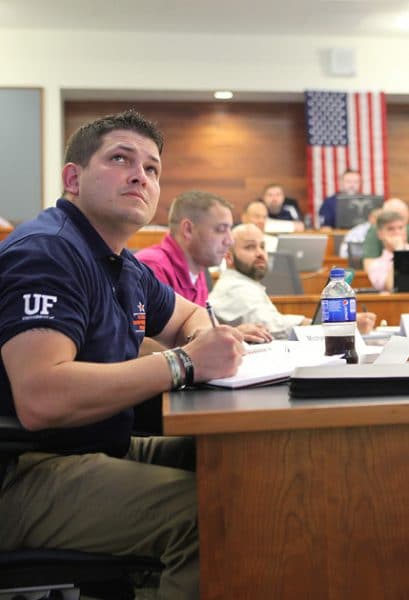Entrepreneurship program helping disabled veterans
Benito Olson was in a hospital bed. His legs were shattered, his wrist was broken and his career in the U.S. Navy seemingly over.
“I had doctors saying that I’d be out of the Navy,” said Olson, a former Chief Petty Officer. “I defied that, and did what I wanted to do.”
He wanted to return to active duty, and did just that serving four more tours in Afghanistan. Now, he wants to train service dogs to help veterans with Post-traumatic stress disorder (PTSD). He is one of 32 veterans learning how to make their businesses successful this week through the Veterans Entrepreneurship Program (VEP) sponsored by the Warrington College of Business Administration’s Center for Entrepreneurship & Innovation.
Olson said he’s wanted to train dogs since he was stationed in Bahrain in 2003. There, he witnessed Navy handlers interacting with their dogs, which are trained to carry out dangerous tasks like detecting explosives.
“The companionship was neat,” he said.
After a few months of working in the kennels in Bahrain, Olson attended Military Working Dog Training School at Lackland Air Force Base in San Antonio, Texas. Months later, he found himself in Iraq working as a dog handler with Navy SEALs.

Former U.S. Navy Chief Petty Officer Benito Olson suffered devastating injuries while serving in Iraq.
On Feb. 7, 2008, Olson and a SEALs unit in Baqubah, Iraq, were searching for the financier of a local insurgent group. The SEALs surrounded a two-story building. As Olson and his dog, Digo, crept close to one of the building’s windows, one of the SEALs tossed a grenade into the building to shock the armed insurgent. Olson knelt down to avoid the effects of the blast. He then felt a wave of pressure, and blacked out.
When Olson awoke, he said he couldn’t see. He said he was trapped underneath one and a half feet of crushed concrete.
“I actually thought somebody had buried me alive,” Olson said.
Olson and Digo survived the explosion, but his injuries were substantial. He suffered multiple breaks in each femur along with the broken wrist.
Only nine months after the explosion, Olson returned to Afghanistan and working with the SEALs. He said nothing compares to the camaraderie and brotherhood of being with the SEALs. And, sadly, nothing compares to the hurt of losing them, like when Afghan insurgents shot down a Chinook helicopter killing 30 U.S. servicemen, including more than 20 SEALs in 2011.
“Those were 30 of our nation’s heroes,” Olson said. “I had quite a few friends on that helicopter, people that I’d worked side by side with, one being the dog handler on there. Mentally…that took me down.”
Olson was honorably discharged for medical reasons in October 2013. He earned a Purple Heart and a Bronze Star with Valor.
Olson said he got the idea to train service dogs to help veterans suffering from PTSD from the Warrior Canine Connection, an organization that uses dogs to help veterans combat stress. Olson said he can handle the dog training aspect of the venture, but needs to learn the business end.
That’s where the VEP program comes in. This week is Phase II, or the “Bootcamp Phase,” where the veterans are exposed to the basics of business ownership for eight days at Warrington.
Dr. Michael Morris, the George and Lisa Etheridge Professor of Entrepreneurship and VEP Director, brought the program to Warrington from Oklahoma State University, where he previously was a professor.
“Veterans struggle both in dealing with their disability and in transitioning to civilian life,” Dr. Morris said. “We hope to help disabled veterans create their own futures, their own jobs, their own wealth through venture creation.”
Olson is determined to start his business, a dog training/boarding company that will eventually fund therapy dogs for veterans with PTSD. He recently finished additional dog training schooling, and he said is even willing to write a book about his experiences if that would help with funding.



